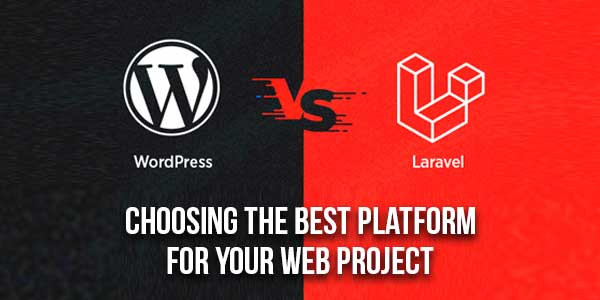
The choice of the platform is one of the most critical factors in web-building projects – these websites and web applications. Two favourite solutions are WordPress and Laravel, which, however, have different advantages and disadvantages. WordPress vs. Laravel – people often compare WordPress and Laravel since both platforms are rather solid, but the types of demands they meet may differ. WordPress is making its name with easy-to-use, countless options of plugins, and great for building websites with a lot of content. On the other hand, Laravel is a strong framework that is best used for building large and high-performance web applications with the possibilities of vertical integration, and the ability to create unique features. This will be a comparative piece that will outline qualities and qualities of WordPress and Laravel which will ease the decision for whoever takes time to read this article. The distinction above will enable you to identify which platform is suitable for your project based on the overall objectives you hold.
Table of Contents
What Is WordPress?
WordPress is a CMS that is based on PHP and is used to create websites and blogs, used by over forty percent of all web development. Originally it was created as a blogging tool, however, it has developed into an extremely popular open-source CMS capable of supporting a wide range of websites from simple blogs to immensely complex online shops. Most WordPress themes and plugins are available to help users create and design web applications without much knowledge of coding.
Pros & Cons Of WordPress:
Pros:
- User-Friendly Interface: WordPress has gained immense popularity due to its ease of use of the graphic user interface even to anyone with no coding skills. It has a flexible dashboard where users can be able to navigate and manage their content on the platform with ease. This is mainly due to a variety of reasons ranging from its simplicity, versatility, and affordability thus favoured by start-ups and those who wish to set up an online company.
- Extensive Plugin Ecosystem: WordPress has an incredible list of over 50,000 plugins and these can be easily integrated by the users to add more features to your website. Whether you want to enhance your site’s SEO prospects, build in e-commerce functionality or simply upgrade your site’s security, there is probably a plugin out there to help. This expansive ecosystem makes it possible to add new features onto the software without having to write coded from scratch.
- SEO-Friendly: WordPress is also SEO friendly with features as well as plugins and it is developed to enable users to optimize their website for search engines. It is also advisable to use such plugins as the Yoast SEO and the All in One SEO Pack which offer tips on the correct page titles, ‘meta’ descriptions, and proper keywording. Some of these features work towards enhancing websites’ result ranking on search engine result pages and thereby increase visibility.
- Community Support: The WordPress family is one of the biggest as it consists of developers, designers and users that help the system to develop. This spirited community provides a lot of support through its discussion boards, lessons and reference materials. Therefore, users can easily get out of specific issues and catch up with new tendencies and approaches.
- Customizability: WordPress offers its users a very high level of web design flexibility since there are thousands of templates and numerous possibilities to configure everything. It allows free and premium themes that can be selected based on the brand and style and extends the site customization by using Custom CSS & Theme Settings. This versatility of framework helps WordPress cater to the needs of different businesses to create customized, brand-related websites.
Cons:
- Security Issues: Since WordPress is the most used CMS, it is prone to hacker attacks and thus WordPress security is an issue of paramount importance. The risks come from consisting of outdated themes, plugins, or core PHP files that hackers take advantage of to infiltrate the system. To avoid the above risks, users need to update their WordPress often and engage the security plugins to protect their sites.
- Performance: WordPress sites may face issues regarding their performance especially when the сайт has a lot of plugins. In particular, each plugin introduces more coding and functions to the site, which results in longer page loading time and worse user experience. There are the aspects of plugins, caching, and sometimes server-side tweaking to achieve high-performance websites.
- Scalability: All in all, WordPress is still capable of handling large websites, however, it is not as competent as some of the web applications software available in the market when it comes to scalability issues. While traffic increases and the site becomes more loaded, its performance stabilizes and can even decrease, additionally, the platform may need to be fine-tuned. In large-scale projects, developers often require complex tricky solutions and configurations to keep WordPress effective and dependable.
What Is Laravel Development?
Laravel Development is an open-source PHP framework, which is built to help developers to make the development process more easy and enjoyable. It is based on the Model – View – Controller (MVC) design pattern which effectively divides the application into business and display logic, thus making coding easier and more comprehensible. Laravel has been dubbed for elegant syntax, extensive documentation, quality and a rich set of tools such as routing, authentication, and caching among others.
Pros & Cons Of Laravel Development:
Pros:
- MVC Architecture: Delivered through a structural MVC (Model-View-Controller), Laravel refines systematic coding, thus improving project solidity and manageability. This article highlights that Laravel keeps business logic, user interface, and data as three different entities simplifying and making the development process easier. It also separates concerns and makes developers pay attention to their responsibilities while also making it possible for an application to grow as it evolves over the usage period.
- Built-In Authentication and Authorization: Again, Laravel makes it very easy to work with authentication and authorizations since the framework offers some ready-made tools to deal with users and security issues. Many developers can organize the procedure of registration and authorization of users, as well as password recovery quickly and without extra effects. The increased and strong security precautions also assist in shielding web applications from such invasions and other security evils.
- Scalability: The architecture of Laravel compels it to be used for building applications that require large volumes of traffic as it allows for this sort of development. These characteristics of the framework include modularity that favours scalability as well as caching and queuing among other strategies that make it easy to handle large-scale operations. Therefore, Laravel is perfect for applications that will experience high traffic and more levels of complexity in future.
- Blade Templating Engine: The tools like the Blade templating engine in Laravel help developers to design their code in the cleanest, most efficient and reusable methods. Blade is lightweight and has a very simple syntax that allows the program to easily insert dynamic contents into an HTML page hence saving time to develop the program. This feature is helpful to manage and update the application as the development process is simplified.
- Comprehensive Documentation: Laravel is backed with vast and categorically structured documentation that can be easily understandable even for a novice. This adds to the fact that the bus has informed examples and detailed guides that assist the users in understanding how to use the various features of the framework. All of these are important in making this documentation a rich source of reference to help the developers fix problems and explore all that Laravel can offer.
Cons:
- Learning Curve: In its turn, Laravel might be less friendly for newcomers in comparison with WordPress thanks to employing the MVC pattern.
- Hosting Requirements: Laravel needs more a powerful hosting solution as compared to the common shared hosting that is used when creating WordPress sites.
- Complexity: On the plus side, web development with its complex structure has the means for far more flexibility and command but this, in turn, lengthens the development period and requires more time and resources.

Comparison Of WordPress Vs. Laravel
- Purpose: WordPress is mostly employed and is famous as a content management system CMS to build and work with content-rich websites like blogs, website news, and business websites. On the other hand, Laravel is a framework which enables web applications to be developed, and this can be more beneficial for complex applications since it has the features and scalability for such projects with specific requirements.
- Ease of Use: WordPress gets credited for genuinely being an ‘easy-to-use’ platform that does not call for much coding skills when creating and handling sites. While Laravel is scalable, it involves coding skills which is useful for developers, who want to launch a unique solution.
- Customization: Another form of flexibility present is customization which can be achieved through the installation of plugins available in WordPress’ library of plugins. Laravel, on the other hand, offers full control through coding hence allowing the developers to create solutions that would be unique depending on the market needs.
- Security: One disadvantage of WordPress is the insecurity that is experienced mostly due to un-updated plugins or poorly developed ones. Laravel, on the other hand, has implicit security features which make the platform stable to guard web applications from dangers.
- Performance: On some occasions, WordPress may have some issues concerning its speed, especially if it is saturated with many numbers of plugins. Laravel has always performed pretty well in terms of speed and performance which makes it better positioned when it comes to resource-hungry applications.
- Scalability: WordPress is perfect for small, and medium websites and blogs but it can be problematic if used for large projects. Laravel is great in scalability, it has a solid framework through which one can build large applications that might need to scale up in terms of traffic and data.
- SEO: WordPress has given importance to SEO and is equipped with many plugins that can assist in ranking a website. However, compared to some other frameworks, you have to customize the SEO in Laravel manually; still, it can be considered a plus because it does not spare developers’ time and effort.
- Community Support: WordPress has an enormous community and plenty of documentation, guides, and forums for users to gain help from. There is also a growing Laravel community with very good support, documentation and an active developer community to turn to in case of issues encountered during the development process.
The difference between Laravel and WordPress is conferred in this table to simplify the decision-making about which platform is more suitable for what task.
What Are The Similarities Between WordPress And Laravel?
Despite their differences, WordPress and Laravel share some common features:
- Open Source: WordPress is an open source tool while Laravel is also open source meaning that anyone can use them for free, and with the help of the internet’s largest community of developers, these tools are also frequently updated.
- PHP-Based: Both of them are developed in PHP language which means they are fully compatible with nearly all existing hosting services.
- Customization: Both of them enable a lot of flexibility, either through plugins and themes in WordPress or through coding in Laravel.
- Scalable Solutions: I see no difference in their ability to deal with different amounts of traffic and data; however, Laravel will fit better in highly scalable applications.
What To Choose Between Laravel Development And WordPress?
Choosing between Laravel and WordPress depends on the project requirements:
- WordPress: Great for users who want a simplistic website or blog that can be built and maintained in little to no time at all. Ideal for informational sites, sites of small companies, and online shops.
- Laravel: Made for developers working on high-development web applications that need some specific features, performances, and security.
Is It Possible To Combine WordPress And Laravel Development?
Yes, it is possible to integrate Laravel with WordPress to be able to take advantage of both web application frameworks. For instance, one can use WordPress to deal with content management and Laravel for power back-end operations, leading to an incredible user experience with disguised effectiveness.
Conclusion- WordPress vs. Laravel
WordPress and Laravel are quite useful in web development though they have their special niche. WordPress is especially useful for those websites that host a multitude of articles and blog posts; Laravel is more suitable when it comes to building web applications from scratch. The best one to choose between the two depends on how it will answer specific project needs, scalability or how far it is required to be customized. Therefore, it’s clear that while understanding the strengths, weaknesses and features of each platform it is easy to make a decision based on your needs.

 About the Author:
About the Author:
















Be the first to write a comment.